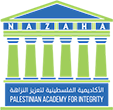Why this training?
The idea of this training was tailor-made in response to the need of having a professional cohort of trainers with sufficient knowledge of integrity, accountability, transparency, and public money preservation. Against the lack of knowledge of integrity and anti-corruption mechanisms among key sections of the Palestinian society such as university students and institutions working at the supervision front, NAZAHA places niche focus on the preventative measures to put a stop to corruption rather than seeing it coming. This rationale led us to build up a sustainable tool. Specialized training is one of the tools NAZAHA wields to achieve its objectives and become in a time to come a training edifice that offers specialized training courses on integrity, accountability, corruption fighting and prepare accomplished trainers and experts in these fields.
The Academy aims at training targeted groups to face and resist the different forms of corruption, including awareness training courses and workshops. Some of the said institutions stand in an urgent need for such courses given their tenderfoot despite the significant role and the critical missions they undertake in the Palestinian society. Such servants could be dragged into the bog of corruption if not trained how to face potential corruption risks.
Who can attend?
NAZAHA provides specialized and general training courses that suit the needs of the target institutions. There are also general training courses for all sections to raise their awareness of integrity, preservation of public funds, and fighting corruption.
All of the training courses aim at benefiting all the sections of society including public servants, university students, academicians, citizens, and the staff of local government units employees as well as different sectors like health, education, and water. Bottom line, the specialized training courses are tailor-made to meet the needs of the target groups.
Significance:
Specialized training gains significance by enhancing the knowledge and skills of callow trainees in relation to integrity and preservation of public funds to perform their tasks integrally and transparently. As for experienced target groups, this training helps them improve the required skills to better perform their tasks. Simply, the specialized training serves as a support and a catalyst to leverage the skills of the target employees to meet the bar of the job requirements and enhance their performance in an integral and transparent fashion.
Suggested Training Modules:
| Module Name | Module Sections |
| The conceptual framework of integrity, transparency, accountability, and anti-corruption |
|
| Public Service Code of Conduct |
|
| Module Name | Module Sections |
| The legal and institutional structures for the enhancement of integrity and corruption resistance in Palestine |
|
| Legal protection of public funds |
|
| Crimes against the duties of the public service |
|
| Reporting corruption and protection of witnesses and whistle-blowers |
|
| Module Name | Module sections |
| Fighting tax evasion and protecting the public funds |
|
| Basics of research and investigation of corruption cases |
|
| The role of audit and control in corruption reduction |
|
| Integrity, transparency and accountability in public procurement |
|
| Module Name | Module Sections |
| The role of religious and educational institutions in promoting integrity, transparency, and corruption fighting |
|
| The role of media in promoting integrity, transparency, and corruption fighting |
|
| The role of the private sector and the civil society in promoting integrity, transparency, and fighting corruption |
|

Introduction
The Academy for Integrity (NAZAHA) aims through this training course at training a group of trainers on the techniques and methods of modern training.
The course focuses on the effective implementation of the training according to a variety of methods, and the basic elements regarding the procedures of the supervision and evaluation. Placing a niche focus on equipping the trainers with the skills of integrity and preservation of public funds, the training also takes into consideration providing examples and case studies regarding such topics.
It is important that the participants have relevant experience in a relevant field such as public administration and law, local governance, health and education sectors, crimes of money laundering, economic crimes, information and investigation, financial control, procurement and bidding, and the general budget. Noting that the Academy looks forward to achieving that through enabling and training the trainers to become experts and professional trainers on integrity and preserving public funds.
General Objectives:
To enable the trainers to implement the training through a variety of mechanisms and methods, and to evaluate the training, efficiently.
Specific Objectives:
Upon active engagement and genuine commitment to the program, the trainees are expected to be able to:
- Draw the basic elements to consider for the success of the training;
- Distinguish the training from the education and identify its objectives and principles;
- Acknowledge and consider the principals of the adult learning in training;
- Establish the stages of the course and the way they relate to each other;
- Draw the components of efficient training;
- Plan for the training in light of the elements of efficient training;
- Identify the qualifications and skills of the efficient trainer;
- Distinguish between the types of trainees and how to approach them;
- Distinguish between the methods of training and choose the suitable one in each situation;
- Efficiently apply the different training methods;
- Evaluate the training with different tools and methods.
Training methods and activities:
The active learning and interactive training methods will be applied, especially role play, case studies, problem-solving, discussions, learning through play, and learning in pairs and groups. The focus will also be on the real and practical activities and examples that are close to the trainees and suit different modes of learning. Such modes allow the trainee to experience a real-life situation. Therefore, the program includes the application of the trainees of a certain practical training activity, as well as receiving feedback on their work.

The second step that comes after training the trainers is building knowledge. The objective of this training course is to build knowledge of the trainers through a one-year-long training programme. It aims to educate and provide them with specific materials, reports, and case studies. It also aims to assign them to learn about integrity by providing them with reading material followed by applied case studies on the material they previously read. Each session will be set to discuss said materials, to then hear the opinions and comments on the subject in hand.
In a similar vein, each session will be given over to cover a specific topic. Accordingly, previous readings and case studies will be sent to the trainers, so the discussion will be based on that. Therefore, knowledge will be built blow-by-blow to put trainers on the road of being experts on integrity.
